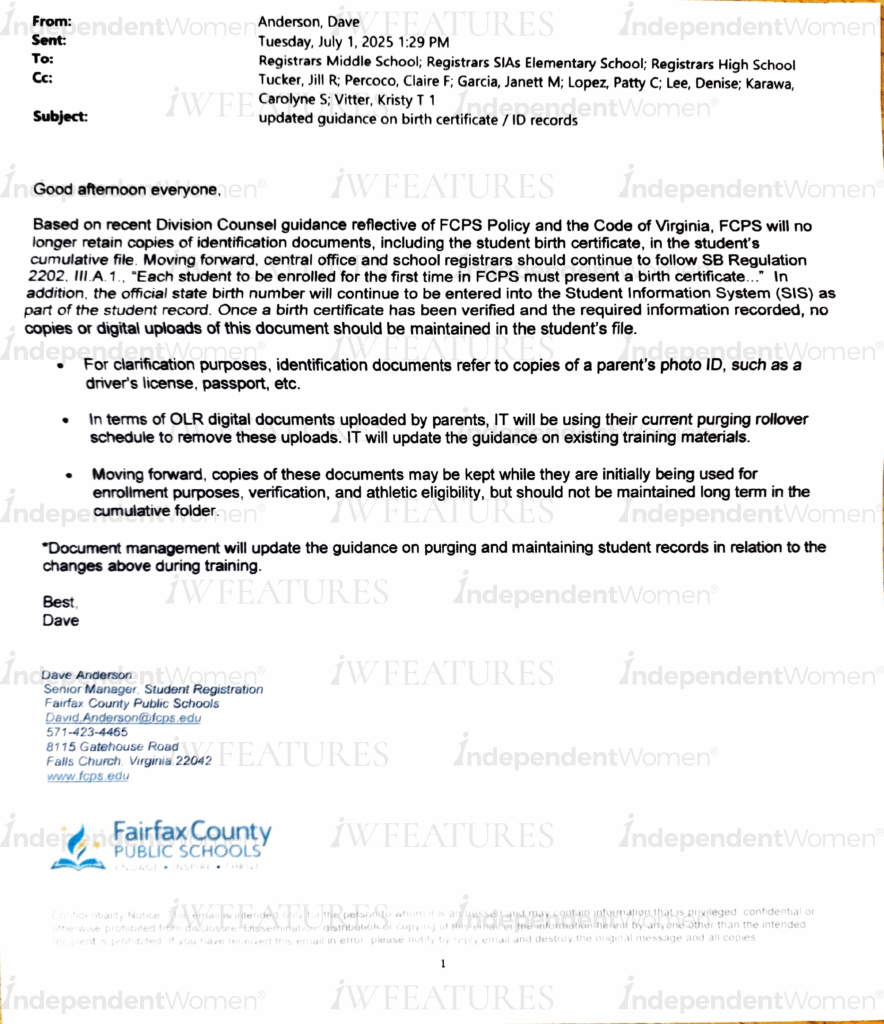Fairfax County Public Schools is issuing new guidance to public school registrars, telling them to purge copies and digital uploads of students’ personal documents from school records.
Schools have long required these legal documents to prove a student’s identity, residence, and relationship to his or her parents and caregivers. Yet, on July 1, Dave Anderson, Fairfax County Public Schools’ senior district manager for student registration, who earns an annual salary of about $150,000, sent an email to school-based registrars that states, “Based on recent Division Counsel guidance…FCPS will no longer retain copies of identification documents, including the student birth certificate, in the student’s cumulative file…For clarification purposes, identification documents refer to copies of a parent’s photo ID, such as a driver’s license, passport, etc.”

The email did not provide registrars with a reason for this policy change, and there has been no official communication with parents about the change. This leaves moms like me, who have three children currently enrolled in Fairfax County Public Schools, wondering why the leaders of the largest public school district in Virginia are suddenly determined to destroy student documents proving students’ identification, residency, citizenship, and relationships to parents.
An inside source who works for the district told IW Features that the policy change is an attempt to evade United States Immigration and Customs Enforcement. If true, this would unfortunately be on brand for Fairfax County. In January 2021, Fairfax County’s Board of Supervisors passed the Public Trust and Confidentiality Policy, which makes the area a sanctuary for illegal immigrants by placing restrictions on sharing and requesting information regarding individuals’ immigration status. Fairfax County Public Schools’ leaders explicitly uphold the county officials’ efforts to maintain a sanctuary county. The website states:
The Trust Policy confirms the School Board’s commitment to providing a safe and welcoming space for all students and their families. It aligns with Fairfax County’s Public Trust and Confidentiality Policy to ensure that FCPS students and families can access FCPS benefits and services without the fear that information will be disclosed, directly or indirectly, to federal immigration officials.
For district leaders who claim to care so much about student security – and in fact have installed metal detectors in all of the high schools this academic year – the directive to destroy students’ identification documents is a glaring blind spot. People with nefarious intent benefit from loopholes. It’s difficult to imagine all the unintended policy consequences that might occur, but purging school identification records that confirm their relationships with their guardians can make children more vulnerable to trafficking, kidnapping, and becoming targets for gang members looking for recruits.
For instance, take the Venezuelan gang, Tren de Aragua, which already has a known presence in Fairfax County. A “no records” policy makes it more desirable to set up shop in our high schools, which might include selling drugs and recruiting children looking for a friend group. If members of Tren de Aragua don’t have to fear federal immigration enforcement coming to their high schools because registrars are simply unable to comply with federal agents’ records requests, operating there is less risky for them than it would otherwise be.
It’s also frightening for parents to imagine showing up to school with their identification to pick up their children, and finding out that the school registrar can no longer confirm if the person there to pick up the child is actually the parent. Fairfax County’s plan seems to be to force school registrars to accept that people have the relationships and legal rights to children that they claim.
More vulnerable children who live in complex family units or who move frequently are also at greater risk. School officials use cumulative records to identify students, for example, who need more help because they have bounced around to six elementary schools in four years. Or worse, if a child goes missing, the school would only have one address on file and would be less helpful in providing information to public safety officials for conducting a wellness check.
People may say that these risks are small, but what’s the upside of destroying all legal identification documents? Does this make students safer? It’s hard to imagine how. They may try to point to privacy and identity theft as a fig leaf, but this is the same leadership that imposes invasive surveys on students, asking about their sex and drug habits, and keeps their answers in their files. So if privacy isn’t the reason to destroy these records, then what is?
Concerns about these policies aren’t limited to safety—they also extend to academics: illegal immigrants who aren’t violent criminals also pose an opportunity cost to the children of taxpayers living in the district. Finite resources meant to support legal residents are stretched thin when an unknown number of illegal immigrants enter the district. 26.8% of Fairfax County Public Schools’ students are English language learners as of 2025—while their immigration statuses are unclear, sanctuary policies add to already overworked ESL teachers and can reduce cohesion in the rest of the school.
At any moment now, registrars in Fairfax County’s 199 public schools will commence purging student records as senior leadership has directed. Whether the school is purging records to evade Immigration and Customs Enforcement (ICE), or is doing so for some other reason entirely, our children are likely to receive a worse education and an increasingly unsafe school environment because of this directive.










